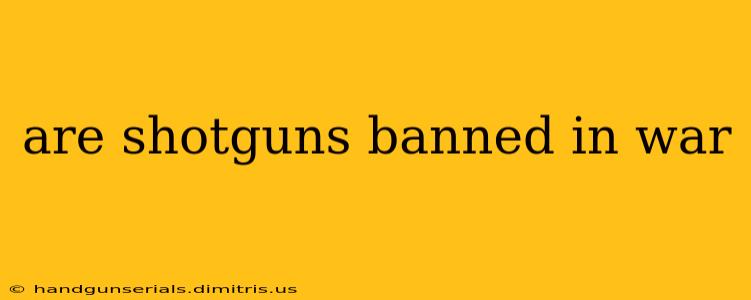Are Shotguns Banned in War? The Complex Reality of a Controversial Weapon
The question of whether shotguns are banned in war isn't a simple yes or no. The reality is far more nuanced, involving international law, practical considerations, and the evolving nature of warfare. While there's no explicit global ban on shotguns in armed conflict, their use is heavily influenced by several factors.
International Humanitarian Law and the Restrictions on Weapons
International Humanitarian Law (IHL), primarily governed by the Geneva Conventions, aims to minimize suffering during armed conflict. IHL doesn't explicitly prohibit specific weapons but focuses on regulating their use to ensure compliance with principles like distinction (between combatants and civilians), proportionality (between military advantage and civilian harm), and precautions (to minimize civilian harm). Shotguns, with their wide spread and potentially indiscriminate nature, face scrutiny under these principles.
The Problem of Indiscriminate Fire
The key issue surrounding shotguns in warfare is their potential for indiscriminate fire. The wide spread of shotgun pellets makes it difficult to precisely target a single individual, increasing the risk of civilian casualties. This is particularly concerning in densely populated areas or close-quarters combat situations. The potential for violating the principles of distinction and proportionality under IHL makes their use problematic.
Practical Considerations and Battlefield Use
Despite the inherent risks, shotguns have seen limited use in various conflicts throughout history. Their effectiveness at close range, particularly in suppressing enemy movements or clearing buildings, has led some armed forces to employ them in specific scenarios. However, the logistical challenges associated with supplying ammunition and the limitations of their range compared to other weapons often restrict their widespread adoption.
The Role of Customary International Law
While no treaty explicitly bans shotguns, customary international law—the generally accepted norms and practices among states—plays a crucial role. The principles of IHL, along with the general prohibition on weapons causing unnecessary suffering, can be interpreted to limit the permissible use of shotguns in certain contexts.
Modern Warfare and Evolving Weaponry
The nature of modern warfare continues to evolve. Technological advancements influence the design and use of weaponry. As such, discussions surrounding the acceptability of certain weapons, including shotguns, are ongoing within the international community and legal frameworks.
Conclusion: A Case-by-Case Assessment
There is no definitive global ban on shotguns in warfare. Their legality and appropriateness depend on the specific circumstances of their use, taking into account the principles of IHL and customary international law. The potential for indiscriminate fire remains a significant concern, rendering their use a complex and often controversial issue on the modern battlefield. The analysis of whether their deployment is permissible in any given situation requires careful consideration of the context, aiming for the minimization of civilian harm and adherence to international legal standards.

